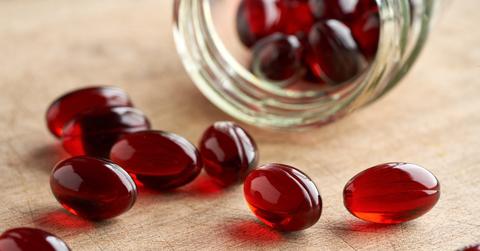Krill Oil May Be Replacing Fish Oil as the Trendy Omega-3 Supplement
Published May 18 2023, 2:17 p.m. ET

Chances are you have heard of someone taking fish oil as a supplement, but what about krill oil? The small fish known as krill is full of benefits in oil form, and like fish oil, is loaded with omega-3 fatty acids.
And surprisingly, some even suggest that krill oil may even be more effective than fish oil in improving your health.

What is krill oil?
Krill oil is derived from small fish called krill, which are usually eaten by seals, whales, and birds. Krill oil has become popular for being especially rich in two omega-3 fatty acids: eicosapentaenoic acid (EPA), and docosahexaenoic acid (DHA), per Healthline.
What are the benefits of taking krill oil?
Like fish oil, which is also full of omega-3 fatty acids, krill oil could improve your overall health. This is because omega-3 fatty acids, which are are essential fats that can help with reducing blood clotting, and inflammation, and could prevent stroke, heart disease, as well as some cancers and skin conditions.
The body does not make enough omega-3 fatty acids on its own and must get the rest from foods with a high omega-3 content. This includes fish, vegetable oils, leafy vegetables, nuts, and flax seeds per Harvard University.

Fish oil is one of the most popular supplements for omega-3s; however, some research may suggest that krill oil could be a better option. Although fish oil contains a higher content of omega-3s than krill oil, krill oil has more phospholipids which aid omega-3 absorption, per Nourish by WebMD.
Similar to fish oil, most krill oil supplements come in a soft gel form, like the Kori Krill Oil Softgels, or even in a gummy form, like these omega-3 gummies.

What are the differences between krill oil and fish oil?
One of the main differences people notice when comparing the two oils is that krill oil is red, while fish oil is yellow. This is because krill oil contains astaxanthin, a carotenoid and antioxidant common in algae and fish, such as salmon, per WebMD.
Some research does show that krill oil may be more effective than fish oil because of its absorption benefits.
One randomized study, published by the National Library of Medicine in 2015, focused on the differences in the bioavailability of fish and krill oil. They found that after giving participants either krill oil or fish oil, those who took krill oil had a higher fatty acid blood content after 72 hours. This suggested that participants absorbed krill oil better than fish oil, indicating that krill oil could be more bioavailable.

In another study, also published by the National Library of Medicine in 2015, researchers compared the fatty acid absorption in the body after taking krill oil and fish oil. They found that there was a small difference in absorption between the two. However, they concluded that more research needed to be done to make any solid claim.
The bottom line is that both fish and krill oil offer benefits from their omega-3 fatty acid content, and for many people either option would impact their health equally.
Alternatively, there are also many plant-based omega-3 options on the market, which are typically made with algae. That said, if you are still unsure about which to take, consider talking to your healthcare provider about what would work best for your body.